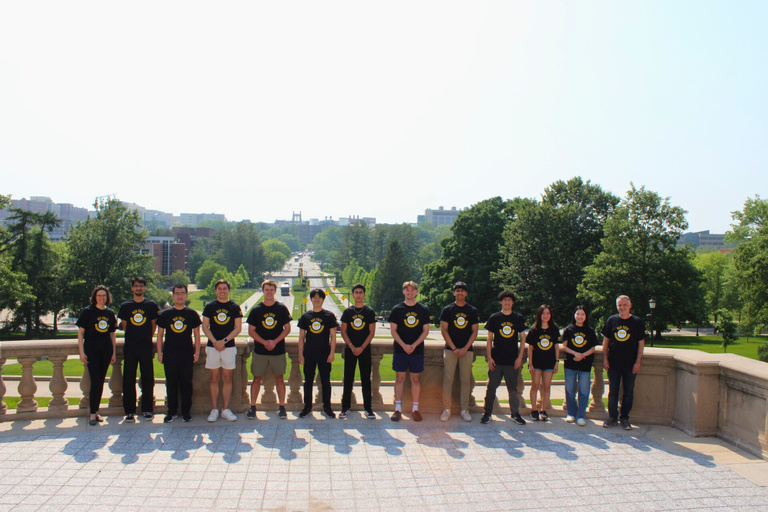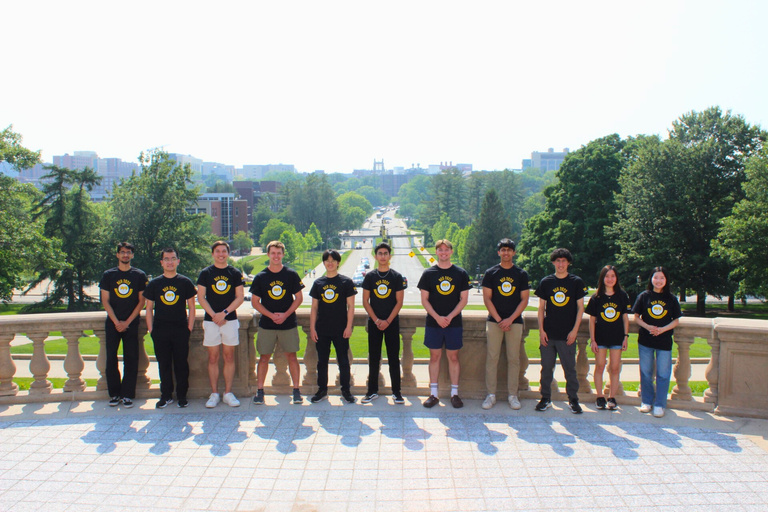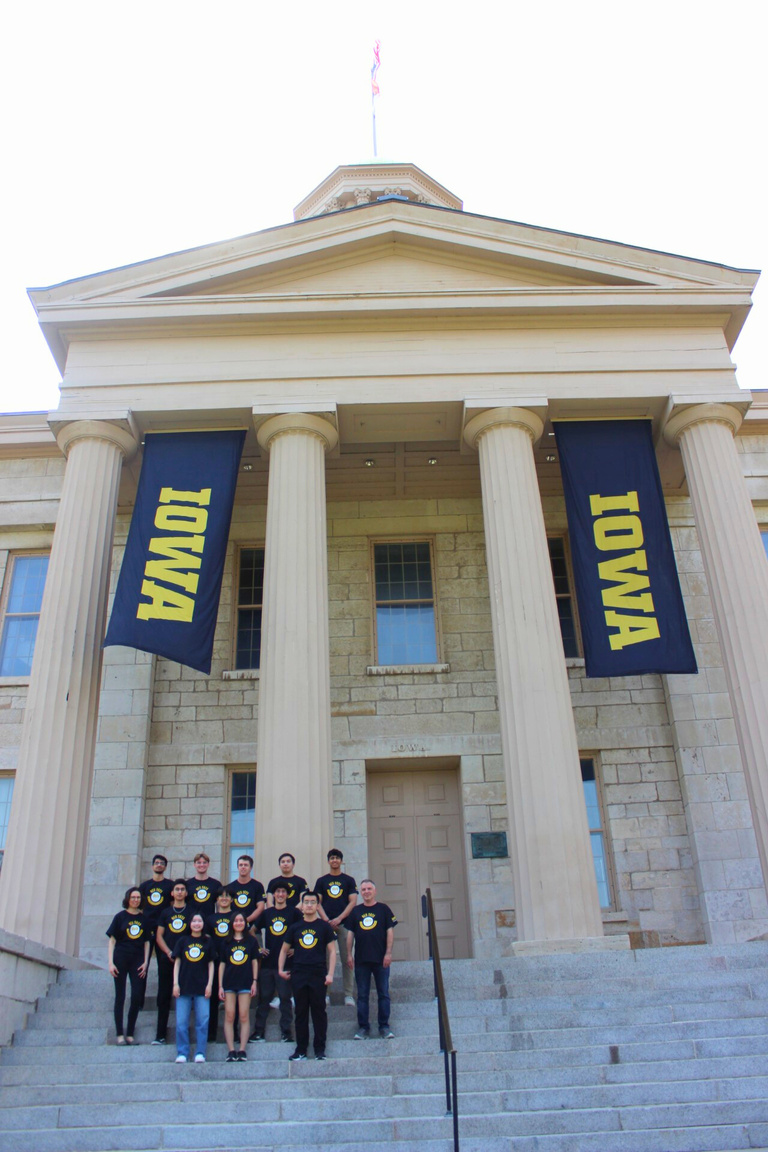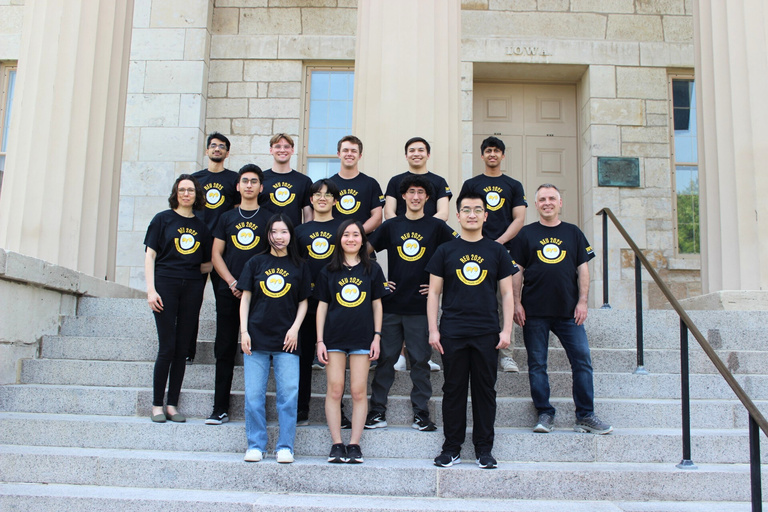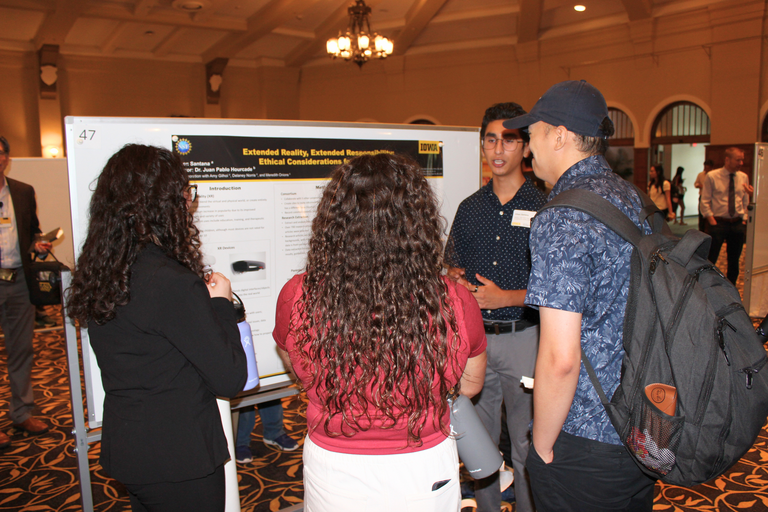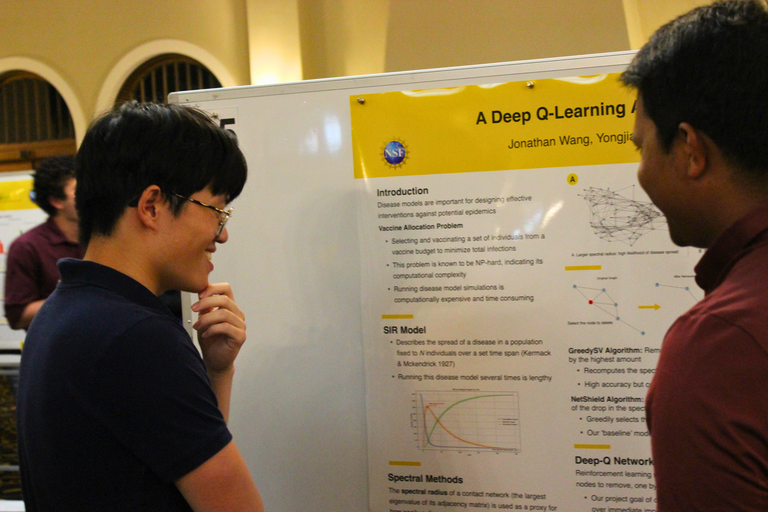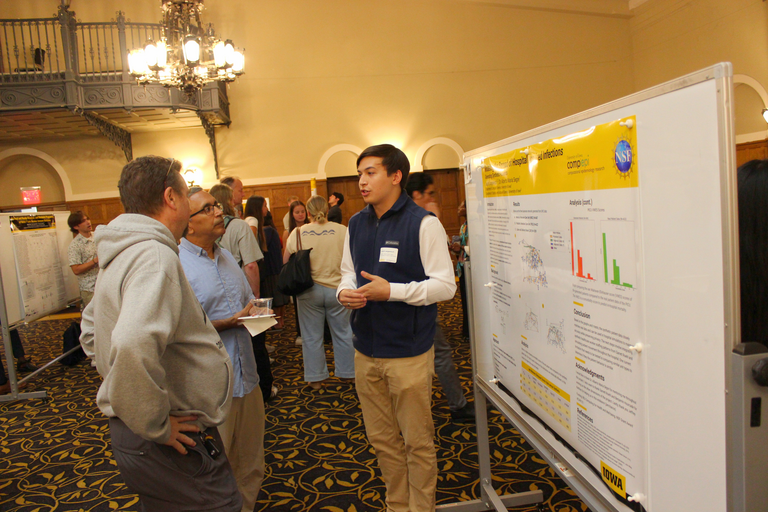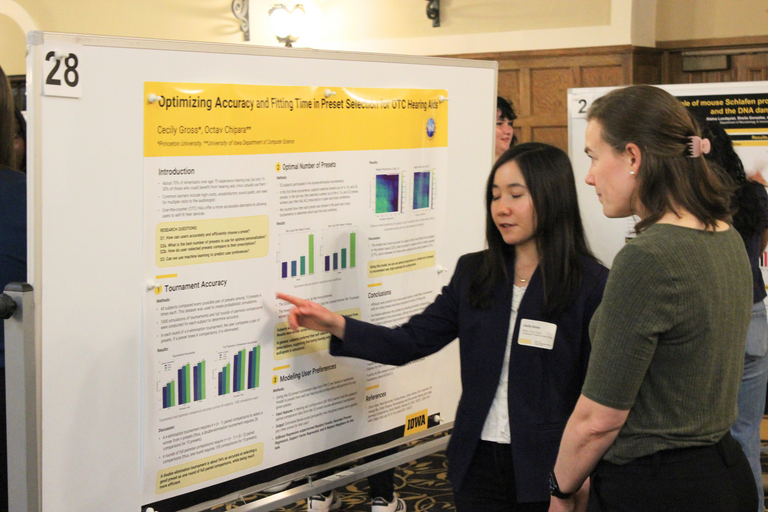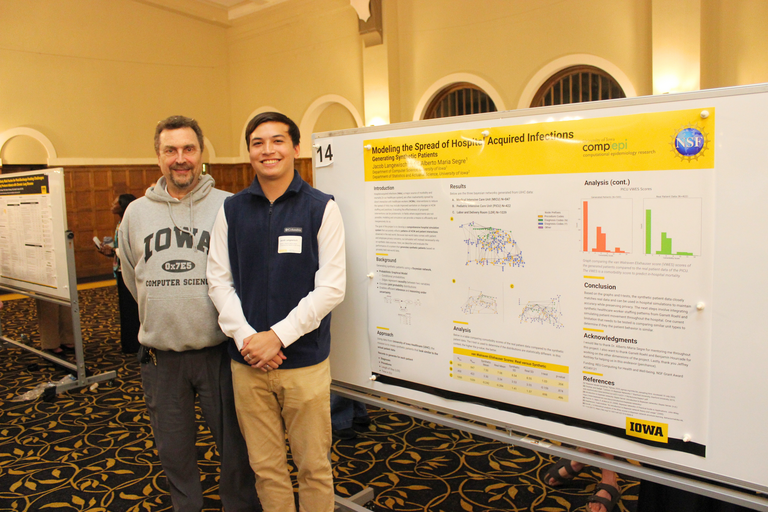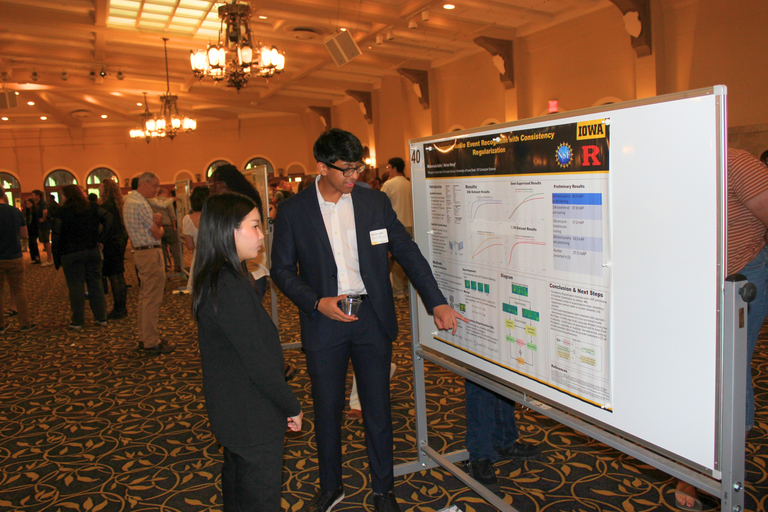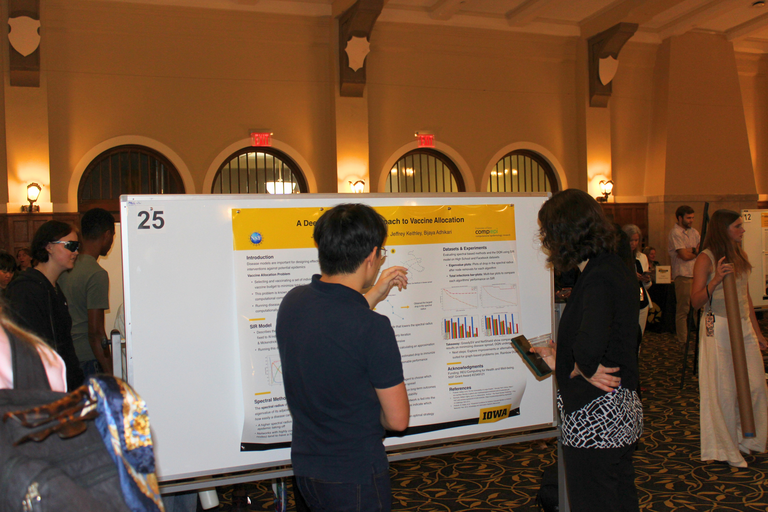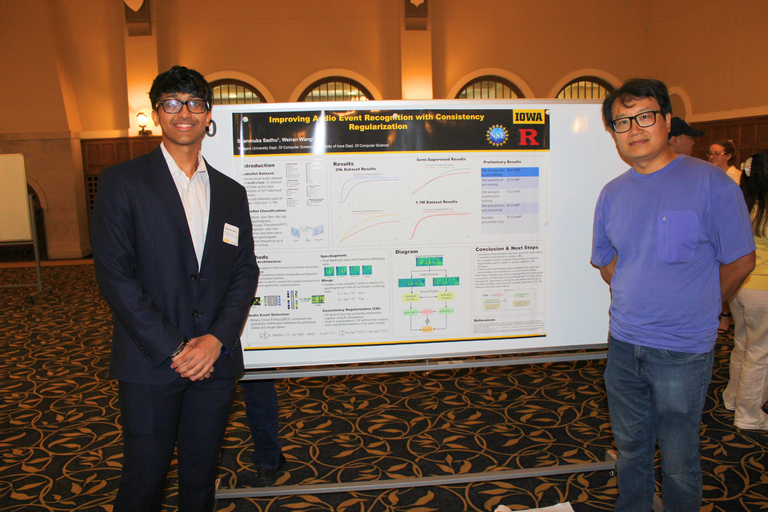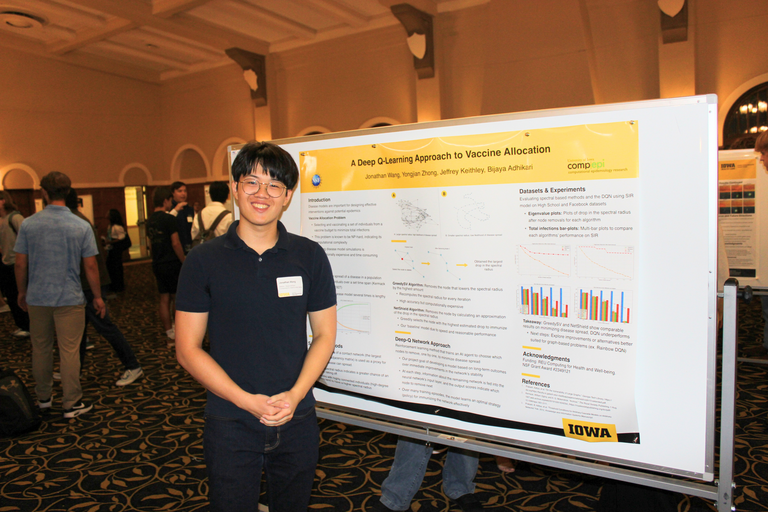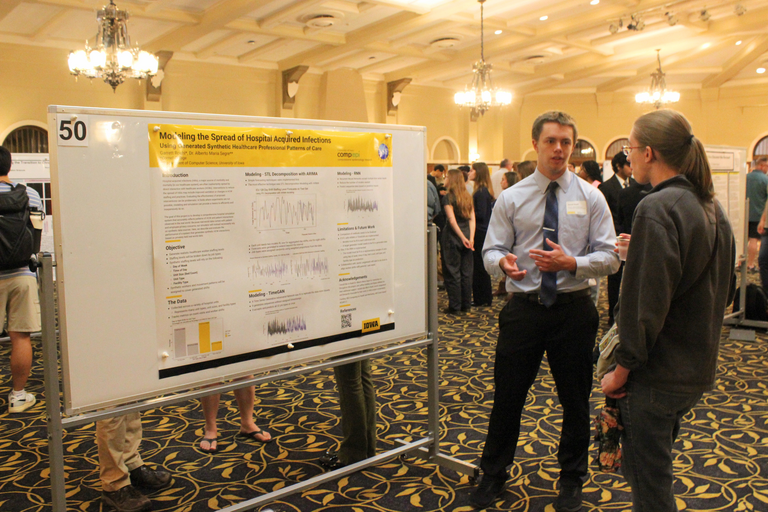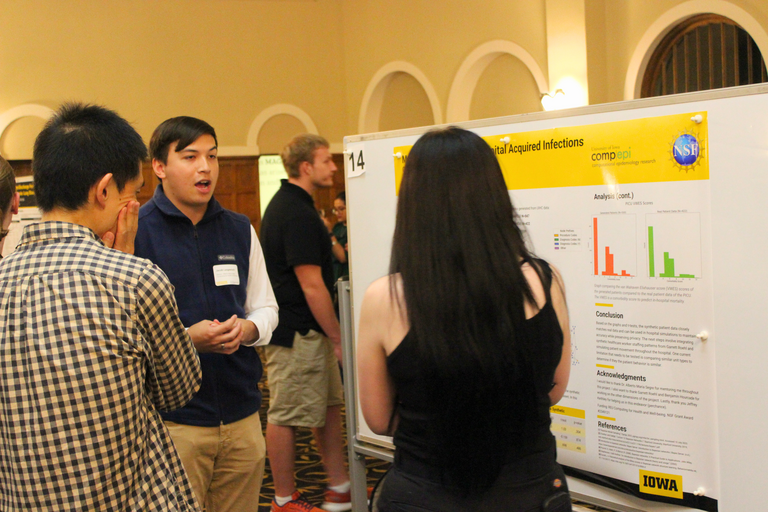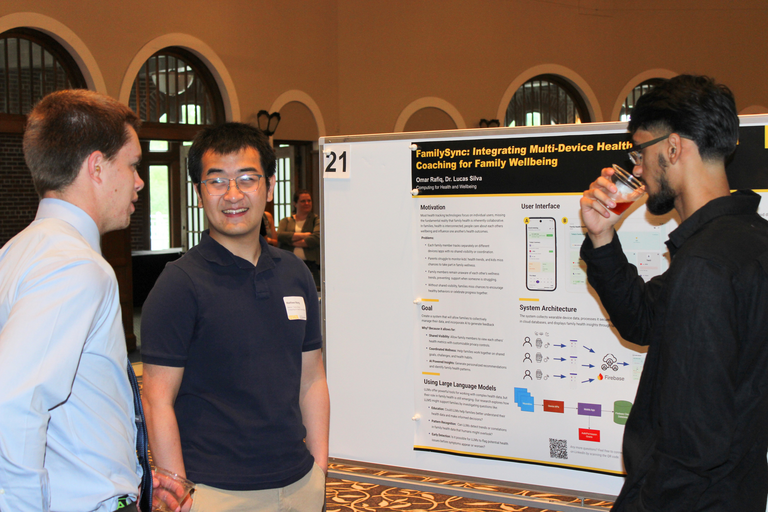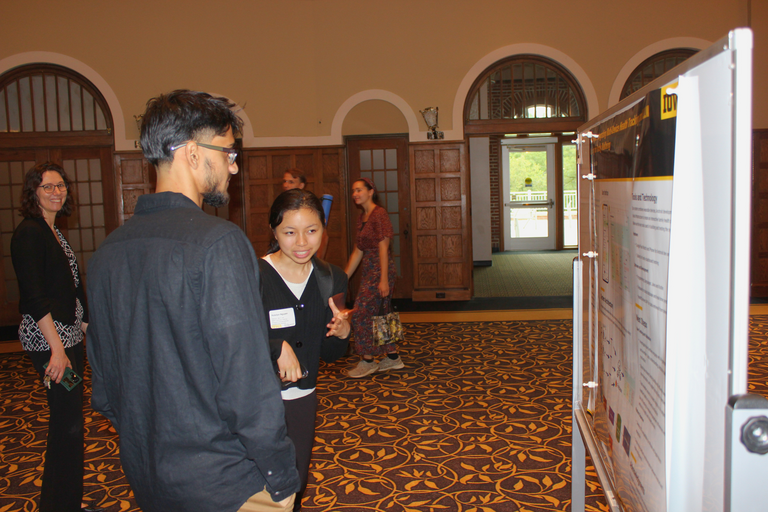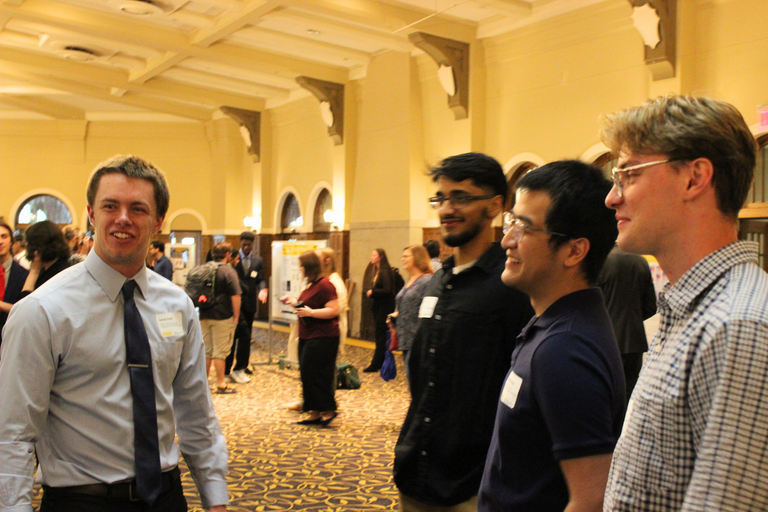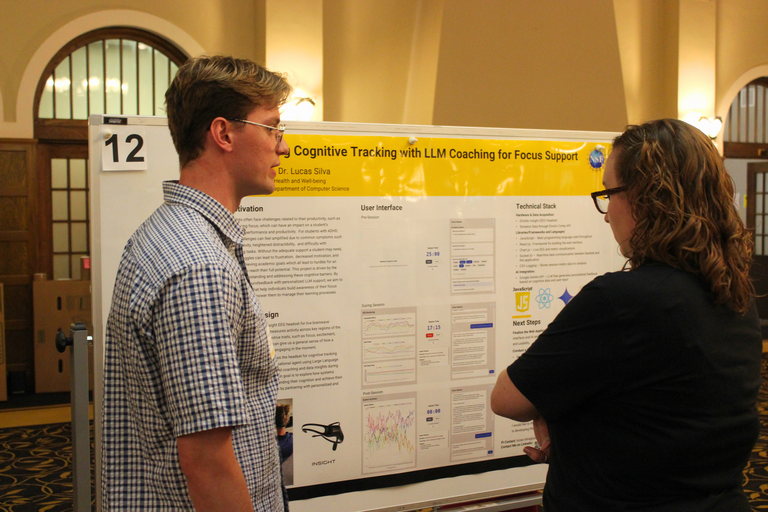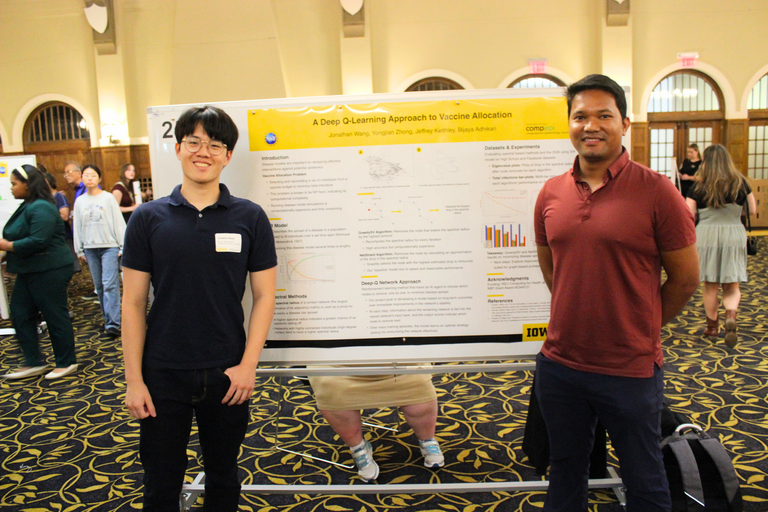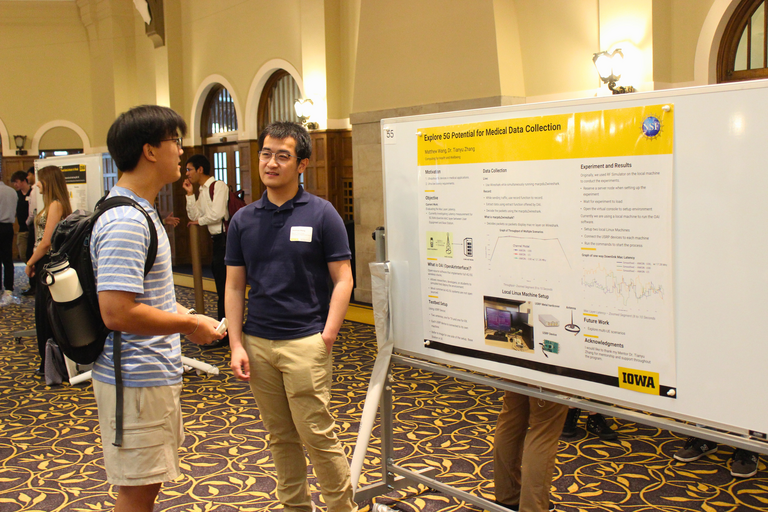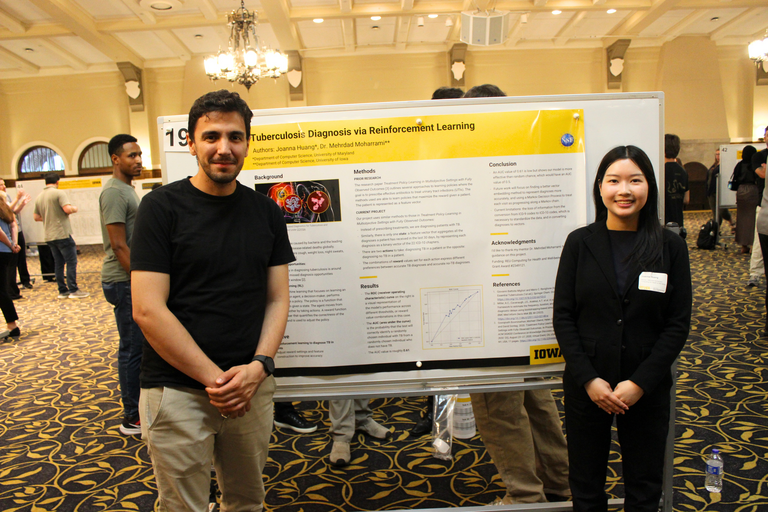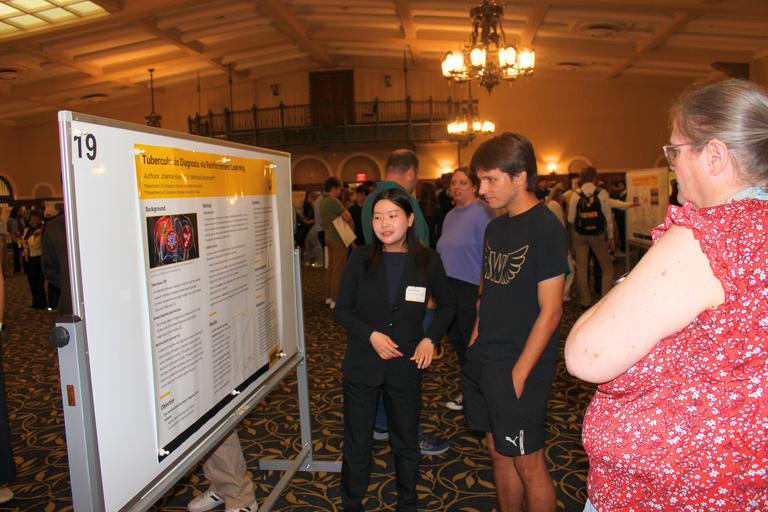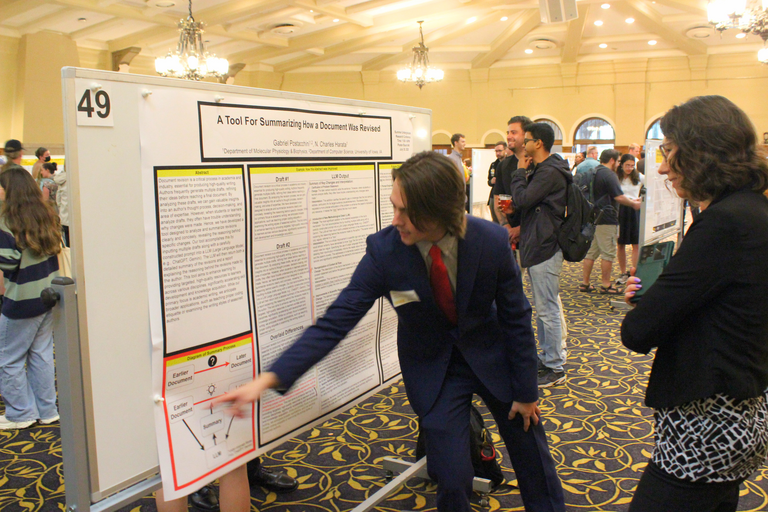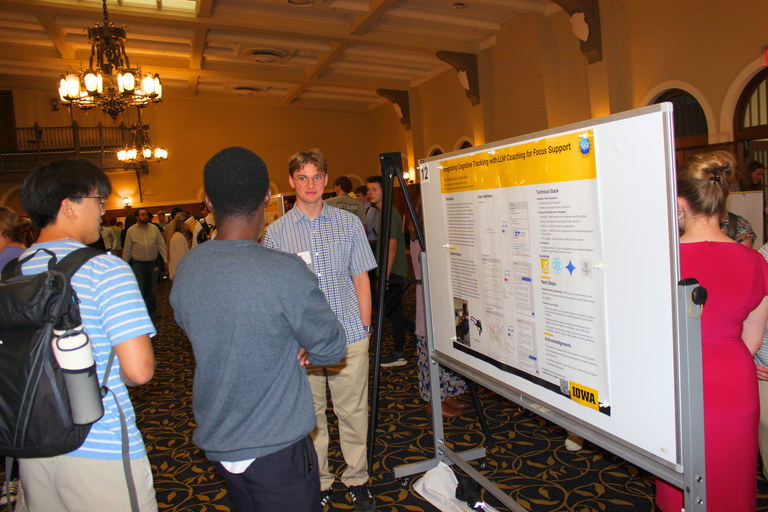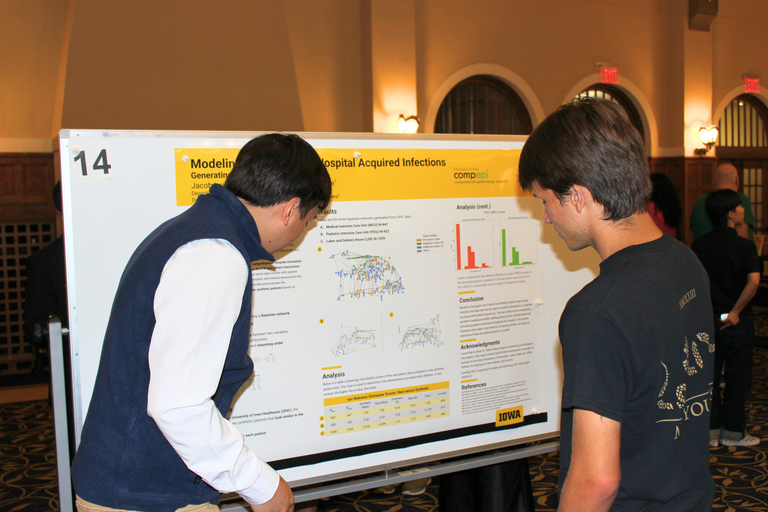In Summer 2025, 11 undergraduates from across the country spent 10 weeks at the University of Iowa as part of the REU: Computing for Health and Well-being. Immersed in full-time research, each student joined a faculty-led lab to tackle real-world problems in computing and health, often collaborating closely with graduate students and other researchers.
Beyond the lab, students built skills through a Data Science Bootcamp, explored career paths in workshops, and bonded over social events and excursions.
From presenting at the joint UIowa & ISU REU Symposium to sharing their work at the Summer Undergraduate Research Conference, students left the program with new skills, stronger networks, and a clearer sense of what research can offer.
Get to know more about the students and their experiences below.
| REu participant | home institution | Research | Mentor |
|---|---|---|---|
| Cecily Gross | Princeton University | Optimizing Accuracy and Fitting Time in Preset Selection for OTC Hearing Aids | Octav Chipara |
| Benjamin Hourcade | University of Iowa | Speeding up disease simulations with cut sparsification | Jeffrey Keithley (PhD student), Sriram Pemmaraju, & Alberto Segre |
| Joanna Huang | University of Maryland College Park | Tuberculosis Diagnosis via Reinforcement Learning | Mehrdad Moharrami |
| Jacob Langewisch | University of Iowa | Modeling the Spread of Hospital Acquired Infections | Alberto Segre |
| Ian Palmroos | Augustana College | Integrating Cognitive Tacking with LLM Coaching for Focus Support | Lucas Silva |
| Omar Rafiq | California State University Fullerton | FamilySync: Integrating Multi-Device Health Tracking and LLM Coaching for Family Wellbeing | Lucas Silva |
| Garrett Roehl | Cornell College | Modeling the Spread of Hospital Acquired Infections | Alberto Segre |
| Shanmuka Sadhu | Rutgers University New Brunswick | Improvement of Audio Event Recognition with Consistency Regularization | Weiran Wang |
| Ethen Santana | Iowa State University | Extended Reality, Extended Responsibility: Ethical Considerations for Children | Juan Pablo Hourcade |
| Jonathan Wang | Grinnell College | A Deep Q-Learning Approach to Vaccine Allocation | Bijaya Adhikari |
| Matthew Wang | University of Nebraska Lincoln | Collecting Medical Data over 5G | Tianyu Zhang |
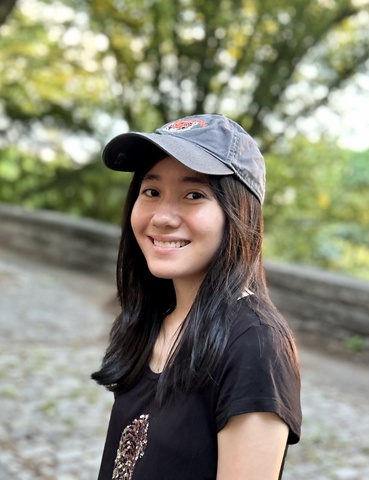
Cecily Gross
Home Institution: Princeton University
Research: "Optimizing Accuracy and Fitting Time in Preset Selection for OTC Hearing Aids"
Can you tell us about your researchproject and what you worked on this summer?
My project was called "Optimizing Accuracy and Fitting Time in Preset Selection for OTC Hearing Aids." The problem we were trying to solve is that most Americans who could benefit from hearing aids don't actually use them, mostly due to high cost, unsatisfactory sound quality, or the need for multiple visits to the audiologist. This can lead to problems like cognitive decline and dementia. However, OTC hearing aids are much cheaper and eliminate the need for an audiologist and users choose the best preset themselves.
For the first part of my project, I ran simulations to find out how users of over-the-counter hearing aids can quickly and accurately choose a preset. For the second part, I investigated the effects of increasing the number of presets on user satisfaction. Lastly, I created a machine learning model that predicts user preferences across the preset space and recommends high-potential hearing aid configurations based on a small number of paired comparisons that the user makes between different presets. This will hopefully improve user satisfaction with the sound quality without increasing fitting time.
What was your favorite part about the REU program?
My favorite part about the REU program was the opportunity to apply what I had learned in school to a real-life problem. I had already taken a class in machine learning at college, but after I did my research, I felt like I had a much better grasp on both concepts and practical uses of machine learning.
How did this experience impact the way you think about research or your future career goals?
Both the research experience and the workshops we did helped me to think more seriously about graduate school. I am still not sure whether I am going to go into industry or do a graduate program after college, but the REU definitely gave me a better sense of the challenges and rewards of doing research in computer science, which is very helpful as I decide what to do next.
Do you have any advice for students who are interested in pursuing research opportunities like REU?
I would say doing research at least once as an undergrad gives you very important insight into whether you want to pursue research further in your academic career. A summer research internship like REU is a great way to do that, as not many colleges include independent work as an academic requirement.
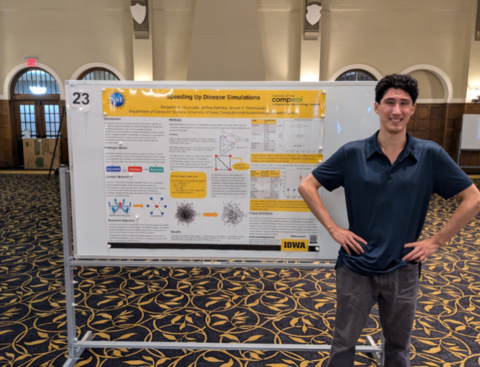
Benjamin Hourcade
Home Institution: University of Iowa
Research: "Speeding up disease simulations with cut sparsification"
Can you tell us about your research project and what you worked on this summer?
This summer, I worked with the Computational Epidemiology (CompEpi) group to efficiently speed up disease simulations without significantly changing disease simulation results (e.g., attack size, infection peak, etc.). To best describe exactly what this means and how I pursued this, I will (briefly) discuss a few points below.
1. Disease simulations are useful for testing out disease interventions (e.g., vaccination) on a population without raising ethical or logistical concerns. These disease interventions are tested on different scenarios over numerous simulation runs, often taking a lot of computational power. This is the essential motivation for speeding up disease simulations.
2. Disease simulations use a kind of edge-unweighted graph called a contact network, where the nodes are people in the population and the edges are contacts between people. Over the course of a simulation, a disease flows over the contact network from infected nodes to uninfected nodes. The runtime of a simulation is proportional to the number of edges in the contact network. So, reducing the number of edges in the contact network is predicted to decrease the average simulation runtime.
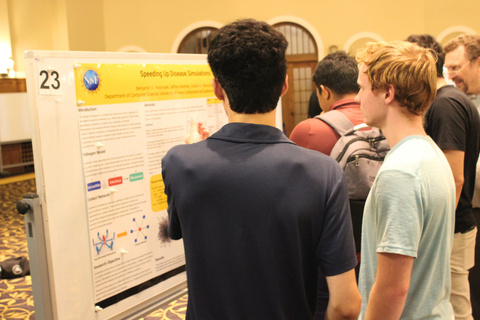
3. Graphs have inherent properties (e.g., cut size, spectral radius, etc.). Edge-unweighted graphs can be transformed into edge-weighted graphs that (almost) preserve these graph properties through a process called sparsification, where all the nodes remain, but some of the edges are removed and the remaining ones are assigned weights. The method I used is called cut sparsification, which approximately preserves the cut size for all cuts.
4. It is predicted that (almost) preserving certain graph properties like the cut size would also result in (almost) preserving disease simulation behavior. This behavior can be best measured by plotting the mean number of people infected, uninfected, and recovered in a population over time across thousands of simulation runs. If the disease curves are similar for both the original and sped up simulations, then disease simulation behavior is approximately preserved.
Considering all of these points, I implemented cut sparsification on contact networks and compared the average disease simulation curves and runtimes to assess the efficiency and accuracy of cut sparsification as a speed up method.
What was your favorite part about the REU program?
I really liked the research faculty interviews that Dr. Kleiman organized. These interviews are interesting because they allow students to view university life through the lens of the research professor. In particular, it was worthwhile to learn about how professors got interested in computer science and research, how they approach doing research and coming up with research ideas, and how they view the importance of research in society and for the future. Professors often discussed different aspects of their professorships during the interviews, and this revealed to me that each professor has a unique perspective on what it means to be a professor and do research.
How did this experience impact the way you think about research or your future career goals?
I found that I like doing research, and I am considering it as a future career option. The most appealing aspect of research to me is that I am constantly learning and discovering something new. As a result, the work never ceased to intrigue me and was full of enjoyment.
What are you looking forward to this school year as you continue your research with Prof. Sriram Pemmaraju?
I am working closely with Dr. Sriram Pemmaraju and PhD candidate Jeffrey Keithley this fall to continue research relating to cut sparsification in the context of speeding up disease simulations. All I can say at the moment is that cut sparsification is a very rich topic that necessitates exhaustive and conclusive experimental and theoretical results. If this research yields very interesting results, it may be admitted into a conference.
Do you have any advice for students who are interested in pursuing research opportunities like REU?
If you are interested in doing research, I would absolutely do a Research Experience for Undergraduates (REU). The purpose of an REU is to introduce students to the world of research while also functioning as a summer internship. If the research is particularly meaningful, it is not unusual to continue to do research during the school year or to be mentioned as part of a published paper.
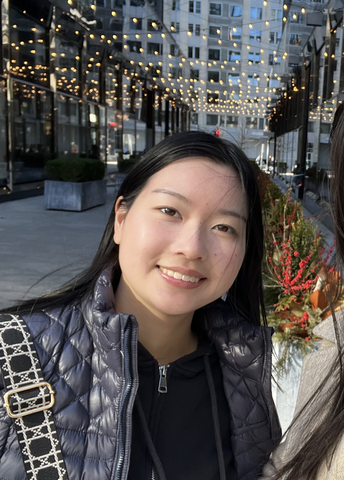
Joanna Huang
Home Institution: University of Maryland College Park
Research: "Tuberculosis Diagnosis via Reinforcement Learning"
Can you tell us about your research project and what you worked on this summer?
My project was building a reinforcement learning model to diagnose tuberculosis in patients using their diagnosis history. I used Python to train and evaluate the model.
What was your favorite part about the REU program?
My favorite part was getting to know all the other students and mentors in our cohort. Everyone was so supportive and helped me adapt to the program.
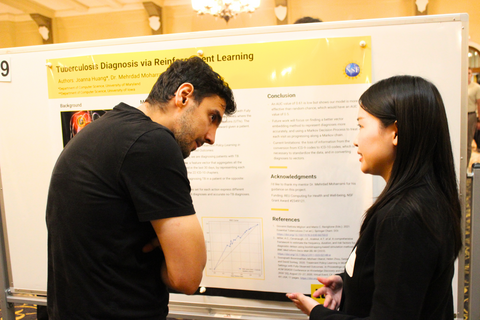
How did this experience impact the way you think about research or your future career goals?
This experience helped me understand whether or not research was a suitable career path for me, and also gave me a better understanding of what goes on in research, from publishing papers to presenting at conferences.
Do you have any advice for students who are interested in pursuing research opportunities like REU?
My advice for students pursuing REU opportunities is to be more selective when picking REUs to apply to, so that more effort can be put into each application.
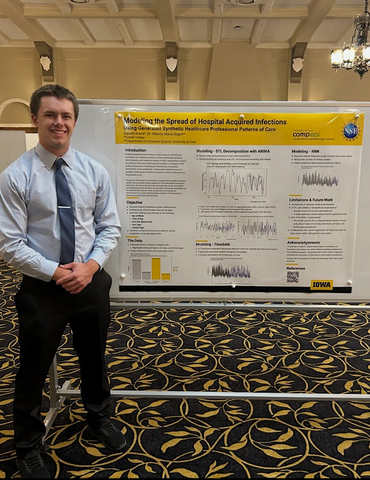
Garrett Roehl
Home Institution: Cornell College
Research: "Modeling the Spread of Hospital Acquired Infections"
Can you tell us about your research project and what you worked on this summer?
I worked on a project called Modeling the Spread of Hospital Acquired Infections. The overall goal of the project is to construct a simulation of a hospital so that different procedures could be simulated across various hospital settings in order to determine which procedures can effectively mitigate the spread of hospital acquired infections. Other students were also working on this project, but I was assigned the focus of generating realistic healthcare professional patterns of care. Thus, my goal was to generate realistic synthetic data for healthcare professionals' patterns of care based off of factors including the type of unit, time of day, day of week, type of facility, and bed count of the unit. I was not able to get to the end of the project, but down the line the goal is that my work will be merged with that of the other students in order to construct the full simulation.
What was your favorite part about the REU program?
My favorite part of the REU program was the opportunity to apply the skills I have learned in my coursework over the past three years towards a real-world project. I enjoyed working through problems and drawing on various things I have learned, and I enjoyed asking others for help and the vast amount that I could learn from talking with professors and other REU students. I was also somewhat amazed at how bright the other students in the program were and how much I could learn from them in effort to solve the problems I came across.
How did this experience impact the way you think about research or your future career goals?
This experience gave me a lot of insight into what research is and what it looks like. Before this program, I did not have any research experience, and I really did not have much of an idea of what it looked like or what it consisted of. I thought it was interesting to see that the professors at a school like the University of Iowa are able to devote so much of their professional time towards solving problems that affect people everywhere. For that reason, I would say that I left the summer with a lot better understanding of the way that research works and its place in our society. I would also say that this program somewhat confirmed my future career goals. I found that I do enjoy working on lengthy data science projects, and I found that pursuing a master's degree would help develop my skills beyond what I currently possess. Thus, I felt that the summer was valuable towards figuring out my future plans.
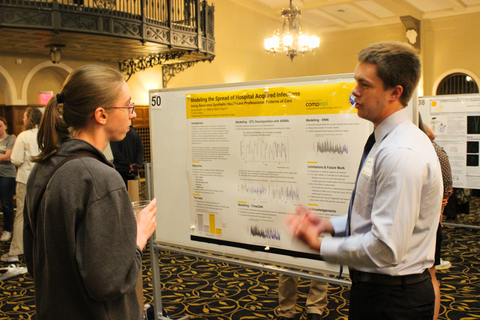
Do you have any advice for students who are interested in pursuing research opportunities like REU?
For any students interested in pursuing research opportunities like REU I would suggest giving it a try. I was somewhat nervous coming into the program and after talking with some of the other students in the program I think a number of us dealt with some level of imposter syndrome, but I found over time that there really wasn't anything to worry about. Furthermore, it was a very valuable summer because I had the opportunity to strengthen my skills, gain experience doing something similar to what I hope to do the rest of my life, and meet a wide variety of brilliant people.

Omar Rafiq
Home Institution: California State University Fullerton
Research: "FamilySync: Integrating Multi-Device Health Tracking and LLM Coaching for Family Wellbeing"
Can you tell us about your research project and what you worked on this summer?
My research project was about exploring AI's role in helping families gain meaningful insights from their health data. I developed a platform that syncs wearable health data to a family dashboard and integrated a conversational AI that can analyze patterns and suggest improvements for the whole family's wellbeing.
What was your favorite part about the REU program?
My favorite part about the REU program was working with my mentor, Dr. Lucas Silva, and connecting with other people in my field.
How did this experience impact the way you think about research or your future career goals?
This experience gave me insight on the research process from experimenting, testing and improving along the way. It also made me consider pursuing grad school.
As you'll be continuing your work with Prof. Silva in the fall, what are you looking forward to?
I'm looking forward to improve upon my project with Prof. Silva and hopefully get it to a point where we can start testing it with real users. It'll be exciting to see how people interact with something I've helped build from the ground up.
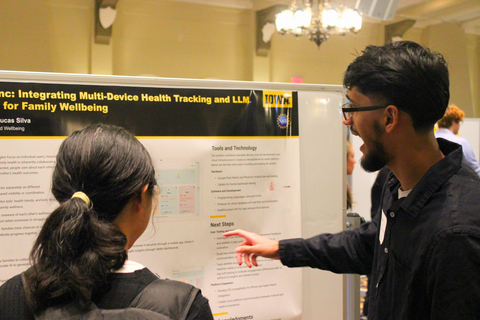
Do you have any advice for students who are interested in pursuing research opportunities like REU?
My main advice would be to be proactive and make connections. Talk to professors about their research, ask graduate students about their experience, and start building those relationships.
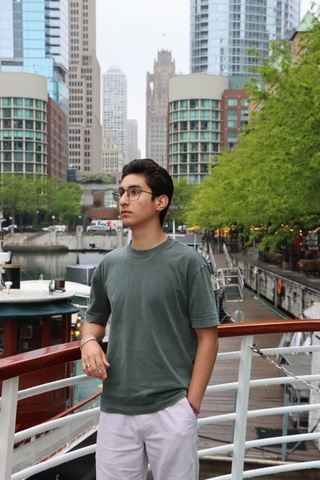
Ethen Santana
Home Institution: Iowa State University
Research: "Extended Reality, Extended Responsibility: Ethical Considerations for Children"
Can you tell us about your research project and what you worked on this summer?
Over the summer, I spent my time researching the ethics of Extended Reality (XR) Technology for children, including Virtual Reality (VR) and Augmented Reality (AR). I worked closely with Dr. Juan Pablo Hourcade and a small team of graduate students. Together, we all did extensive research and data extraction on around 120 different research articles, looking at their methods, participants, potential concerns, measures taken to prevent negative outcome, etc. I also had the opportunity to work on planning the future research similar to this one.
What was your favorite part about the REU program?
My favorite part of the REU was when our cohort met with the cohort from and REU from Iowa State University also related to computer science. The whole experience was fun, meeting people, presenting our researching, and learning about theirs. It was really cool to see what others were doing, specifically at my own college as well.
How did this experience impact the way you think about research or your future career goals?
My goal regarding careers is to be able to create a positive impact on the world, to utilize my skills and knowledge to help others in any way I can. I was honored to be able to partake in this REU as it's goals lined up directly with mine. With this I was able to take the first steps into achieving my goal, and I ended up enjoying it more than I thought I would. This REU has also increased my interest in potentially attending graduate school, as there was not only a graduate school workshop, but I worked directly with graduate students as well. Overall, it has increased my optimism for my future, along with starting to get me think about my plans after getting my undergraduate degree.
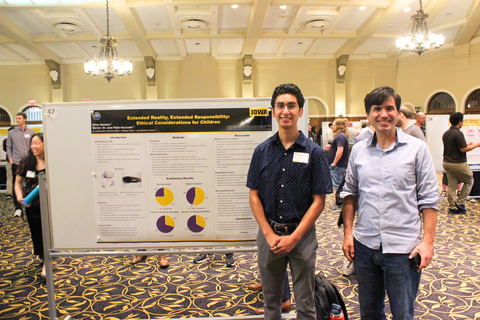
Do you have any advice for students who are interested in pursuing research opportunities like REU?
My advice for students who are interested in REU's: When applying for REUs, a good applicant cares about the actual project. Of course, you will not enjoy a project if you are not interested in it, but you are also a lot more likely to be selected if you genuinely do care about the project, and are able to express that in your writing/interview.

